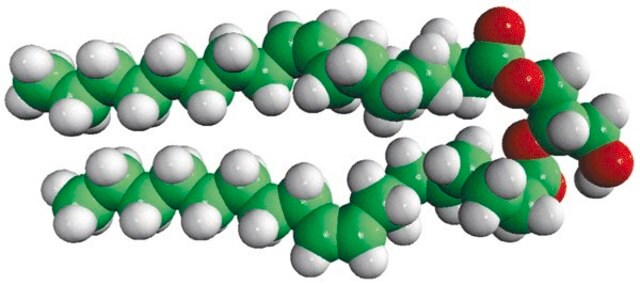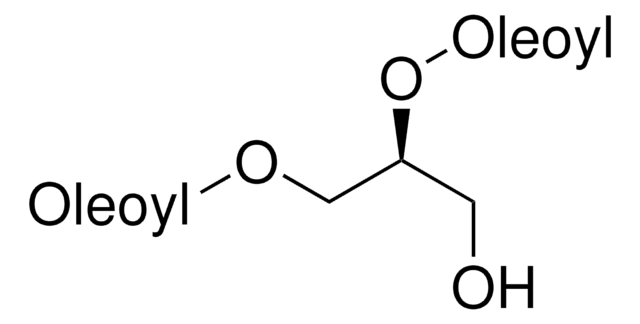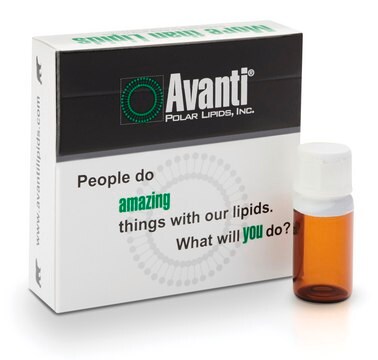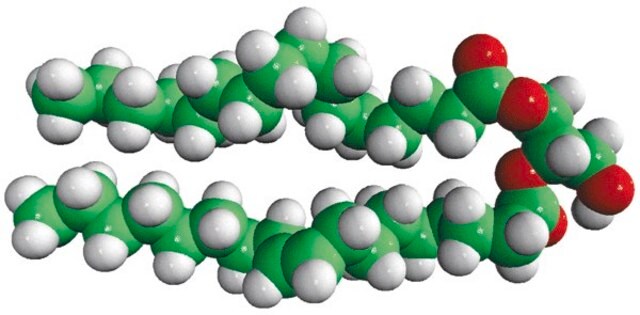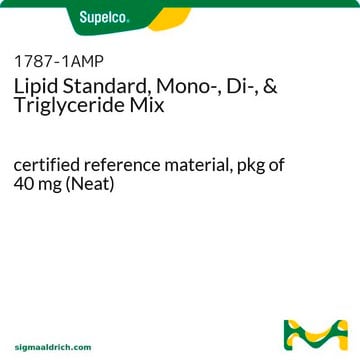800811C
Avanti
18:1 DG
1-2-dioleoyl-sn-glycerol, chloroform
Synonym(s):
1-2-di-(9Z-octadecenoyl)-sn-glycerol; DG(18:1(9Z)/18:1(9Z)/0:0); DOG
About This Item
Recommended Products
Assay
>99% (TLC)
form
liquid
packaging
pkg of 1 × 5 mL (800811C-10mg)
pkg of 1 × 5 mL (800811C-25mg)
pkg of 1 × 8 mL (800811C-200mg)
manufacturer/tradename
Avanti Research™ - A Croda Brand 800811C
concentration
2 mg/mL (800811C-10mg)
25 mg/mL (800811C-200mg)
5 mg/mL (800811C-25mg)
lipid type
neutral glycerides
neutral lipids
shipped in
dry ice
storage temp.
−20°C
SMILES string
O([C@H](COC(=O)CCCCCCC\C=C\CCCCCCCC)CO)C(=O)CCCCCCC\C=C/CCCCCCCC
InChI
1S/C39H72O5/c1-3-5-7-9-11-13-15-17-19-21-23-25-27-29-31-33-38(41)43-36-37(35-40)44-39(42)34-32-30-28-26-24-22-20-18-16-14-12-10-8-6-4-2/h17-20,37,40H,3-16,21-36H2,1-2H3/b19-17+,20-18-/t37-/m0/s1
InChI key
AFSHUZFNMVJNKX-CSWDEDFYSA-N
General description
Diacylglycerol mimicks the effects of the tumor-promoting compounds phorbol esters.
Application
- in the lipid-protein overlay screen assay with Arabidopsis Rho-like GTPases recombinant protein and Arabidopsis plasma membrane H+-ATPase
- in the preparation of the Golgi-like liposomes
- in giant unilamellar vesicles (GUVs) preparation
Biochem/physiol Actions
Packaging
Storage and Stability
Other Notes
Dry samples of diacylglycerol in chloroform, using a stream of nitrogen. Dissolve the residue in an appropriate volume of ethanol or DMSO, then dilute to the desired aqueous medium.
Most biological responses saturate at 20 to 250 μM sn-1,2-dioctanoylglycerol. Only sn-1,2 isomers appear to be active.
Legal Information
Signal Word
Danger
Hazard Statements
Precautionary Statements
Hazard Classifications
Acute Tox. 3 Inhalation - Acute Tox. 4 Oral - Aquatic Chronic 3 - Carc. 2 - Eye Irrit. 2 - Repr. 2 - Skin Irrit. 2 - STOT RE 1 - STOT SE 3
Target Organs
Central nervous system, Liver,Kidney
WGK
WGK 3
Choose from one of the most recent versions:
Certificates of Analysis (COA)
Sorry, we don't have COAs for this product available online at this time.
If you need assistance, please contact Customer Support.
Already Own This Product?
Find documentation for the products that you have recently purchased in the Document Library.
Customers Also Viewed
Our team of scientists has experience in all areas of research including Life Science, Material Science, Chemical Synthesis, Chromatography, Analytical and many others.
Contact Technical Service